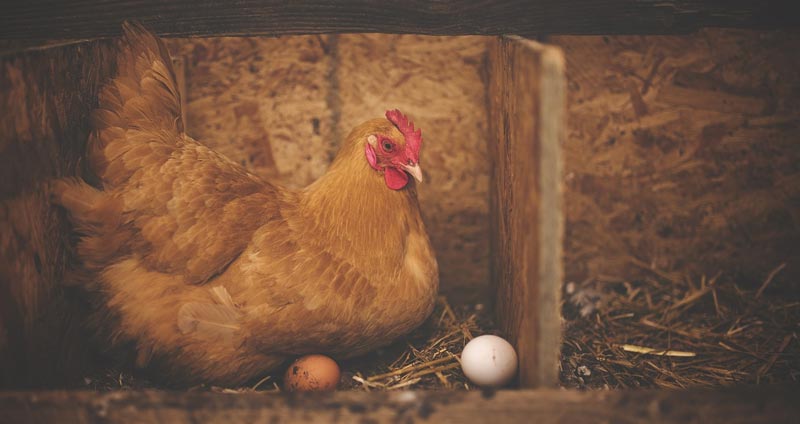There are a couple of reasons why people keep chickens. They’re either kept as normal pets, used for pest control, eaten for their meat, or, most commonly, used for their egg production. We have been benefiting from chickens’ eggs for thousands of years, as the constant production of this healthy food is very appealing to many.
A few questions arise when it comes to egg production, though. Specifically, many people aren’t aware of exactly what time of day chickens lay eggs. Knowing this can help you better accommodate the needs of your chickens and determine whether or not they’re healthy and normal.
Table of Contents
What Time Do Chickens Lay Eggs?
Broadly speaking, most chickens lay their eggs in the morning up until noon, or around 4 to 6 hours after sunrise. However, this is not a guaranteed laying schedule, and there are several factors that can influence when a chicken lays their eggs.
The chicken egg-laying process is quite involved and takes a good amount of time. Despite this, with proper care, chickens will enter a laying cycle that is relatively simple to predict and follow. This, though, results in the chickens laying at different times throughout the week.
A chicken may start the week laying earlier in the morning, and get later and later before skipping a day altogether. This behavior may seem strange, but it is easily explained.
Factors That Influence Laying Times
Several factors play into what time a chicken will lay their egg. There are both internal and external factors that play big roles in the timing of laying, with some being controllable and some not. Regardless, understanding what these factors are will help you to better understand a chicken’s egg-laying cycle.
Exposure To Light
Light exposure plays a very big role in a hen’s egg laying since a hen’s reproductive system is photosensitive and controlled by a photo-period. One a hen’s body is exposed to sufficient amounts of light, their body begins the formation of an egg.
Chickens require at least 14 hours of light in order to lay eggs properly. However, a chicken with 16 hours of light exposure will produce at maximum efficiency. This light exposure works to start and maintain the egg laying process, so lower levels will naturally result in delayed laying.
Ovulation Timing
The ovulation period of a chicken is quite influential in their egg laying times. Very soon after an egg is laid, the ovulation period starts again and typically takes 26 hours to complete a cycle.
This means that a chicken can lay an egg at 8 am, begin ovulation, and be ready to lay by 10 am the following day.
If a chicken lays an egg in the afternoon, they may delay laying an egg the next day since chickens don’t lay eggs at night. This results in healthy chickens laying about 5 to 6 eggs per week.
Breed Of Chicken
The breed of a particular chicken plays a role in the frequency of their egg laying. There are many different types of chickens, and they have all been bred and raised to fulfill a particular purpose. While some chickens are bred for their meat yield, others are bred to produce as many eggs as possible.
One of the most efficient egg producers is the Isa Brown chicken, easily producing between 300 and 350 eggs per year and starting to lay around 16 weeks of age.
Egg color is also indicative of egg-laying times. Brown egg-laying breeds lay earlier in the day and produce more reliably, with white and tinted egg-laying breeds laying later on in the day
Should Chickens Be Locked Up In The Morning?
Some chicken owners may think that it’s necessary to lock up their chickens in the morning to ensure that they’re all laying properly. Fortunately, this isn’t the case most of the time, with chickens gladly laying their eggs in the morning and then going about their lives. However, sometimes it may be necessary.
Whether you have a brand new flock or your chickens are just refusing to lay in their designated nests, keeping them locked up for the morning could be effective at helping to form good habits. Most of the time large corrections can be made in just a week or two. Note that this isn’t particularly pleasant for the chickens, so keep close tabs on their progress.
If a chicken is laying eggs outside of their coop, it’s often in a nest that’s hidden away. It’s important that you remove the nest and any eggs from this spot so that the chicken no longer sees it as a good nesting spot.
To encourage nesting within a coop or nesting box, a lot of chicken owners place fake eggs in nests to show that it’s safe to lay there. Golf balls, ceramic eggs, and even smooth stones make for very effective fake eggs. Additionally, using an experienced hen as a “guide” within a coop to show new hens where to lay.
Best Time To Collect Eggs
As discussed, most chickens will lay eggs within their designated laying spot within the first few hours of daylight. Some chickens lay a bit later, and some lay a bit earlier, but most of them by 2 or 3 pm. Therefore, if you collect the eggs by mid-morning or early afternoon, you’ll usually get the best yield.
It’s important that you know when the best time to collect your flock’s eggs is so that you can remove them from the coop as soon as possible. Eggs that are left in nests too long can cause hens to become broody and defensive — something that no owner wants. It can also lead to egg destruction or eating.
Why Would A Chicken Lay Eggs At Odd Times?
There are a couple of reasons why a chicken may lay an egg or two at strange times. The most obvious reason is poor light exposure. If a chicken isn’t getting enough light, then their bodies won’t undergo ovulation and produce eggs in the first place. Winter months can sometimes result in decreased egg production.
The diet of the chickens is also quite important. If a chicken isn’t receiving the proper diet, then they won’t be able to create the egg yolk, white, or shell. All of these require a good amount of vitamins and minerals, so a poorly-fed chicken will take longer to produce them or stop producing them altogether.
Chickens can also have the occasional hiccup within their system. If a yolk is released too late on accident, a chicken may lay an egg very late in the day. Stress and disease can also cause occasional hiccups like this.

